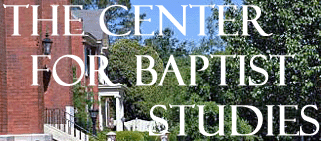|
Encouraging scholarship, strengthening faith identity, and interpreting contemporary issues in Baptist life. |
||
 |
|
Resources: |
|
Home • Staff • Local Church • News & Views • Issues • Bulletin • Conferences / Seminars • Sabbaticals • Certificate • Links |
||
|
John Clarke, Ill Newes From New England by Walter B. Shurden Callaway Professor of Christianity Executive Director, The Center for Baptist Studies Mercer University, Macon, Georgia Quick quiz! Who was the most important and influential Baptist in seventeenth century America? Roger Williams! "Wrong!" say Baptist historians A. H. Newman, Edwin Gaustad, W.R. Estep, and many others. They are unquestionably correct. The most important Baptist in seventeenth century America was a medical doctor by the name of Dr. John Clarke (1609-1676). Clarke did much more than work on sick bodies. He worked on a sick society! The sick society was Colonial New England. Clarke founded the second Baptist church in America, the First Baptist Church in Newport (1644), Rhode Island. One of the most passionate advocates of liberty of conscience in America’s history, John Clarke stands out as one of the mountain peaks of Baptist history in America. No spiritual isolationist who kept his distance from messy politics, Clarke secured from King Charles II of England a new charter for Rhode Island Colony. The charter guaranteed full religious liberty for the little colony. Later elected to the General Assembly of Rhode Island, Clarke also served three terms as deputy governor of the colony. We primarily remember Clarke, however, for Ill Newes From New England, a fiery Baptist tract exposing religious persecution in seventeenth-century New England. Read carefully only a small part of Clarke’s very long title: Ill Newes from New-England: or A Narrative of New-Englands Persecution. Wherein Is Declared That While old England is becoming new, New-England is become Old. He meant, of course, that at the very time that Old England valiantly struggled to awake to the joyous sunshine of freedom of conscience, New England sadly wielded the "sword of steel" to repress conscience. The myth stubbornly persists in American history that the founders of this country came here to establish religious liberty for all people. Not so! It is true that many of the earliest settlers came here to escape religious persecution. They came to America, however, to establish religious liberty for themselves, not for all citizens. Few people anywhere in the seventeenth century believed in religious liberty as a principle for all people. Universal religious liberty evolved as a hard-earned freedom in America. Anti-establishment forces dismantled the last state church in this country in 1833, more than two centuries after the founding of the earliest colonies. Baptists, we should be grateful to know, helped lead the parade for universal liberty of conscience. And John Clarke was the Baptist drum-major for freedom in the seventeenth century! Yet most Baptists have never heard of him. Clarke has been dwarfed by Roger Williams, the towering founder of both the colony of Rhode Island and the first Baptist church in America at Providence, Rhode Island. But Williams, who made enormous contributions to the American tradition of religious liberty, regretfully stayed with Baptists only a few months. He then became a "Seeker," virtually giving up on all institutional and denominational expressions of Christianity. John Clarke, on the other hand, served Baptists in the colonies faithfully for more than three decades. In 1651, John Clarke and two of his church members, John Crandall and Obadiah Holmes, courageously traveled from Newport, Rhode Island, to Lynn, Massachusetts, to conduct a worship service in the home of William Witter, a blind and aging Baptist. That trip became one of the most famous events in American Baptist history. It also became the occasion for John Clarke’s Ill Newes from New England. Civil authorities brusquely interrupted the Baptist worship service in old man Witter’s house that day. Then they arrested Clarke, Crandall, and Holmes, eventually taking them to Boston to be tried for breaking the intolerant laws of Massachusetts. Friends paid fines for Clarke and Crandall, and they were released. But Obadiah Holmes refused to let his fine be paid. As a result he was lashed thirty times with a "three-coarded whip" on Market Street in downtown Boston. At the end of the humiliating whipping, Holmes looked to the civil magistrates and said, "You have struck me as with Roses" (51). Clarke had asked previously for an opportunity to debate the Puritan clergy on the questions surrounding freedom of worship. He did not get that debate. But the next year, while visiting in England, Clarke wrote Ill Newes from New-England. Very intentionally he sent a copy to the Parliament of England. He fervently hoped that it would become political leverage for the rulers of England to rid New England of its intolerance. In this classic Clarke narrated the Baptists’ imprisonment in 1651. Important for the narrative alone, Ill Newes also contained important primary documents--court proceedings, autobiographical statements, and a confessional statement--which made Ill Newes all the more persuasive. Clarke obviously intended Ill Newes, consisting of these multiple documents, to serve several different functions. First, Ill Newes, a historical document, detailed the unjust treatment of the three Rhode Islanders. In maybe the most serious understatement in Baptist history, Clarke described the Lynn incident as a "discourteous treatment." By graphically describing the incivility of the Massachusetts magistrates toward the three Baptists from Rhode Island, Clarke also exposed the harsh laws of religious discrimination of the Commonwealth. Second, Ill Newes served as a theological document in several ways. It constituted a bombastic theological attack on the religious prejudices of Puritan New England. Also, it repudiated the way Puritans ordered their church life with, among other things, the practice of infant baptism. Incidentally, if you ever suspected that the appeal for religious freedom came from soft and uncertain religious convictions, you should read Ill Newes for sternness of conviction alone. Our Baptist ancestors were nothing if not sure of themselves. In fact, they suffered from self-righteousness! In addition to exposing Puritan prejudices and repudiating Puritan church life, Clarke gladly confessed his Baptist understanding of Christianity. The longest part of Ill Newes contained Clarke’s valuable confession of faith, one of the earliest confessional statements we have from the pen of Baptists in America. Third, Clarke cleverly directed Ill Newes toward the civil rulers of Old England. With calculating deference, he referred to the English rulers as the "rod and staff" of "the most high." Clarke hoped, of course, that the powers of Old England would exert pressure on New England to grant some elbow room for freedom of conscience in the colonies. What did Clarke say in Ill Newes? He said ...conscience was that "sparkling beam from the Father of lights and spirits that...cannot be lorded over, commanded, or forced, either by men, devils, or angels...." (6); ...conscience or the inward person can only be dealt with by way of "convincing, converting, transforming, and as it were a-new creating of them" (7); ...that he wanted the Puritans delivered from their false zeal for God which led to "soul murdering" (10); ...that the Puritans who wronged him, Crandall, and Holmes had "much more wronged your own souls in transgressing the very law, and light of nations...." (16); ...that living in New England was no different from living in Rome. Of the Puritans he said that one must "doe as they doe, and say as they say, or else say nothing, and so may a man live at Rome also" (65). ...that it is unbiblical, unchristlike, unnatural, and unspiritual (makes hypocrites of people) to coerce conscience (97-109); What may we learn from this Baptist doctor from Rhode Island? Many things to be sure. Clarke lived when Baptists constituted a distinct minority. You and I live in a time when Baptists have become the largest Protestant group in America. Maybe we should pause, take stock of the minorities among us--people such as Clarke and Holmes and Crandall--and recommit ourselves to religious freedom for all on the basis of principle.
Note: For a copy of Clarke’s classic, see Colonial Baptists:
Massachusetts and Rhode Island in The Baptist Tradition, Edwin
S. Gaustad, advisory editor, (New York: Arno Press, A New York Times
Company, 1980). Page numbers above refer to this edition. |
||
|
The Center for Baptist Studies, Mercer University, 1400 Coleman Avenue, Macon, GA 31207 Phone (478) 301-5457 |
||
